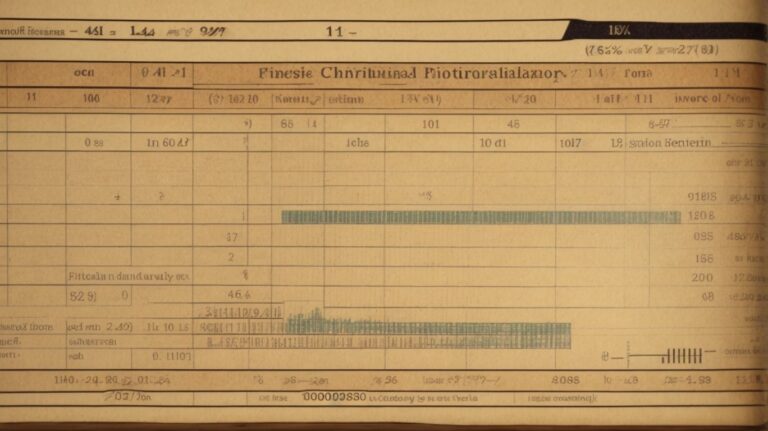Have you ever wondered why you behave the way you do, or how your personality influences your relationships and career choices? Understanding personality is crucial for self-awareness and personal growth.
In this article, we’ll delve into the different theories of personality, examine the ‘What Kind of Person Am I’ psychology test, and explore the benefits of taking a personality test. We’ll also discuss the accuracy of personality tests and how understanding your personality can impact your life.
Whether you’re curious about personality psychology or looking to gain insight into yourself, this article has got you covered.
Contents
- 1 Key Takeaways:
- 2 What Is Personality?
- 3 Why Is Understanding Personality Important?
- 4 What Are the Different Theories of Personality?
- 5 What Is the ‘What Kind of Person Am I’ Psychology Test?
- 6 What Are the Benefits of Taking a Personality Test?
- 7 How Accurate Are Personality Tests?
- 8 How Can Understanding Your Personality Help You?
- 9 Frequently Asked Questions
- 9.1 What is a ‘What Kind of Person Am I’ psychology test?
- 9.2 What does the number ‘1’ represent in the reference data?
- 9.3 How many questions are typically included in a ‘What Kind of Person Am I’ psychology test?
- 9.4 Can the results of a ‘What Kind of Person Am I’ psychology test change over time?
- 9.5 Is a ‘What Kind of Person Am I’ psychology test a reliable indicator of personality?
- 9.6 Are there any limitations to a ‘What Kind of Person Am I’ psychology test?
Key Takeaways:
What Is Personality?
Personality refers to a set of enduring traits and behavior patterns that shape an individual’s unique characteristics and interactions with the world around them.
These traits and behavior patterns are influenced by genetic, environmental, and situational factors.
Personality encompasses a wide range of characteristics, including emotions, attitudes, and interpersonal skills.
Psychologists have proposed numerous personality theories to explain these traits, such as the Five-Factor Model, which includes dimensions like openness, conscientiousness, extraversion, agreeableness, and neuroticism.
Empirical studies have supported the validity of these traits, demonstrating their impact on various aspects of an individual’s life, including career choices, relationships, and mental well-being.
Why Is Understanding Personality Important?
Understanding personality is crucial as it influences an individual’s decisions, relationships, and emotional responses, shaping their interactions with the environment and people around them.
Personality not only impacts an individual’s choices but also affects how they perceive and react to the world. It plays a significant role in shaping the social dynamics, determining the way individuals engage and communicate with others.
Emotional regulation, a crucial aspect of mental well-being, is also greatly influenced by personality traits. People with different personality types cope with emotions differently, affecting their overall mental and emotional stability. Therefore, grasping the intricacies of personality can enhance understanding of oneself and others, thus facilitating smoother interpersonal interactions.
What Are the Different Theories of Personality?
Several theories have been proposed to understand personality, including trait theory, psychodynamic theory, humanistic theory, and social cognitive theory, each offering unique perspectives on the nature of personality and behavior.
Trait theory emphasizes the stability of individual differences in behavior, attributing traits as the fundamental units of personality.
Psychodynamic theory, based on Freud’s work, focuses on the influence of unconscious processes and childhood experiences on personality development.
Humanistic theory emphasizes self-actualization and personal growth, considering individuals as inherently good with potential for positive growth.
Social cognitive theory integrates cognitive, behavioral, and environmental factors to explain personality and behavior, emphasizing the role of observational learning and self-efficacy.
Trait Theory
Trait theory focuses on identifying and categorizing the fundamental traits and behaviors that contribute to an individual’s personality, with prominent models such as the Big Five (OCEAN) providing a framework for empirical validation and comprehensive assessment of traits.
By examining various aspects of an individual’s demeanor, including their openness, conscientiousness, extraversion, agreeableness, and neuroticism, the Big Five model offers a comprehensive approach to understanding and categorizing their personality traits.
Moreover, empirical validation plays a crucial role in trait theory, ensuring that the identified traits and behaviors are rooted in substantial evidence from empirical research, bolstering the reliability and validity of the model. This approach allows for a more nuanced and comprehensive assessment of an individual’s personality, aiding psychologists and researchers in understanding the diverse nuances of human behavior and traits.
Psychodynamic Theory
Psychodynamic theory delves into the influence of unconscious processes, emotions, and motivations on shaping an individual’s personality and behavior, proposing intricate interplays within the psyche that manifest in various personas and behaviors.
This theory places a significant emphasis on the impact of early childhood experiences, particularly in the formation of self-concept and relationships. It suggests that unresolved conflicts from childhood can shape an individual’s adult personality and behavioral patterns.
The concept of defense mechanisms, such as repression and displacement, is integral to understanding how individuals cope with internal conflicts and maintain psychological balance.
Humanistic Theory
Humanistic theory emphasizes the uniqueness of each individual’s personality, behaviors, and decisions, attributing these aspects to the interplay between personal experiences and the environment, encouraging personal growth and development.
This perspective assumes that individuals have an inherent tendency towards self-actualization, seeking fulfillment of their potential and striving for personal improvement. It underlines the significance of subjective feelings, as well as the role of awareness and lived experiences in shaping one’s motivations and choices.
Humanistic theory underscores the impact of supportive, nurturing environments in fostering positive development, highlighting the importance of empathy, authenticity, and understanding in promoting psychological well-being.
Social Cognitive Theory
Social cognitive theory focuses on the role of social influences, interactions with friends and groups, and research-based observations to understand the development of personality and behaviors within social contexts.
This theory, initially proposed by Albert Bandura, underscores the importance of observational learning. Individuals acquire behaviors and attitudes by observing others.
The theory also delves into the influence of social reinforcement, emphasizing how rewards and punishments shape one’s behavior within a social framework. It acknowledges the impact of group dynamics and the powerful role that social norms and cultural expectations play in shaping individual personality and behavior.
What Is the ‘What Kind of Person Am I’ Psychology Test?
The What Kind of Person Am I psychology test is a quiz designed to assess an individual’s personality traits, behaviors, and characteristics for entertainment purposes, offering insights into cognitive styles and decision-making patterns.
The personality test consists of a series of questions that delve into various aspects of an individual’s preferences, reactions, and thought processes. By analyzing the responses, the test provides a glimpse into the individual’s inclinations towards extroversion, introversion, openness, conscientiousness, and other personality traits.
However, it’s important to note that the test is not intended for professional evaluation. Instead, it aims to offer an enjoyable and lighthearted way for participants to reflect on their unique characteristics and tendencies.
How Does the Test Work?
The ‘What Kind of Person Am I’ test operates by presenting various scenarios and choices, allowing individuals to uncover their genetic predispositions and the personas they adopt in different settings, akin to actors wearing masks in a theater.
This unique methodology delves into the individual’s responses to scenarios, shedding light on their inherent behavioral tendencies and inclinations.
By analyzing the choices made, the test reveals underlying genetic predispositions towards certain behaviors and traits.
The concept of personas as masks used in theater serves as an illustrative metaphor, emphasizing how individuals may don different ‘masks’ or personas depending on the circumstances, unveiling their complex psychological makeup.
The test’s scenario-based approach provides a nuanced understanding of how individuals navigate social interactions and relationships, offering valuable insights into the interplay of nature and nurture in shaping one’s personality.
What Are the Different Types of Personality Traits Measured by the Test?
The ‘What Kind of Person Am I’ test measures various personality traits, including open-mindedness, conscientiousness, agreeableness, extraversion, and neuroticism, offering insights into how individuals adapt to different environments and social dynamics.
Open-mindedness reflects an individual’s receptiveness to new ideas, experiences, and information, shaping their approach to novelty and change.
Conscientiousness measures organizational skills, dependability, and goal-directed behavior, influencing their work ethic and decision-making.
Agreeableness gauges one’s inclination towards cooperation, empathy, and harmony in interpersonal relationships, contributing to teamwork and conflict resolution.
Extraversion assesses sociability, assertiveness, and positive emotionality, impacting their social confidence and engagement.
Neuroticism evaluates emotional stability, resilience, and susceptibility to stress, affecting their coping mechanisms and emotional regulation.
What Are the Benefits of Taking a Personality Test?
Taking a personality test can offer valuable insights into one’s behavioral patterns, emotional tendencies, and cognitive styles, serving as a diagnostic tool and facilitating more effective communication with mental health professionals.
The results of a personality test can shed light on how an individual interacts with others, copes with stress, and approaches decision-making.
Understanding these aspects not only aids in self-reflection but also fosters empathy and improved relationships with peers, family, and colleagues.
The test’s outcomes can provide a foundation for meaningful conversations about mental well-being and potential areas for personal growth, promoting a proactive approach to mental health discussions.
Enhanced self-awareness, a key benefit of personality assessments, enables individuals to recognize and address their strengths and areas for development, laying the groundwork for self-improvement and overall well-being.
How Accurate Are Personality Tests?
The accuracy of personality tests varies based on factors such as the test’s empirical validation, privacy policies, and the expertise of individuals administering the assessments, influencing the reliability and relevance of the results.
Empirical validation serves as a crucial determinant of a personality test’s accuracy. This involves rigorously testing and validating the assessment’s effectiveness in predicting and analyzing personality traits across diverse populations.
Furthermore, privacy policies play a pivotal role in ensuring the confidentiality of test-takers’ sensitive information. This ultimately impacts their willingness to engage honestly in the evaluation process. The proficiency of test administrators also significantly influences the interpretation and conveyance of results, thereby affecting the overall efficacy of the personality test.
How Can Understanding Your Personality Help You?
Understanding your personality can provide valuable insights that influence career choices, interpersonal relationships, and personal growth, enhancing emotional intelligence, decision-making, and interpersonal charisma.
When you are aware of your natural tendencies, strengths, and weaknesses, it becomes easier to identify career paths that align with your interests and preferred working styles. This self-awareness can lead to greater job satisfaction and professional fulfillment.
Understanding your personality traits can significantly improve the dynamics of your interpersonal relationships by fostering empathy, effective communication, and conflict resolution skills.
In personal growth, the ability to recognize and understand your emotions and behaviors enables you to make constructive changes, overcome challenges, and establish healthier habits. This self-awareness serves as a cornerstone for refining decision-making skills, as it enables you to align choices with your values, aspirations, and long-term objectives.
By honing your emotional intelligence through self-awareness, you can enhance your leadership abilities and enhance your impact in various spheres of life.
Career Choices
Understanding your personality can guide career choices by aligning unique motivations and cognitive styles with research-based insights into suitable professional paths, fostering fulfillment and success in the workplace.
By harnessing this understanding, individuals can make informed decisions regarding their professional trajectories, considering factors such as their cognitive strengths and preferences.
For instance, someone with a preference for creativity and innovation may find fulfillment in a role that allows for autonomous problem-solving and idea generation. On the other hand, individuals with a penchant for structured processes and attention to detail might thrive in roles that require methodical analysis and precision.
Relationships
Understanding your personality can enhance relationships by fostering emotional intelligence, empathy, and adaptable behaviors, aligning with the principles of the APA and promoting harmonious interactions within personal and professional spheres.
Developing emotional intelligence allows individuals to recognize and understand their own and others’ emotions, which is essential for effective communication and cooperation in relationships. By nurturing empathy, individuals can better connect with others, contributing to improved mutual understanding and support.
The ability to recognize and adapt to different personality traits and communication styles is crucial in fostering harmonious interactions. This aligns with the principles of the APA, emphasizing the importance of respectful and ethical conduct in interpersonal relationships. Understanding personality dynamics can facilitate more effective teamwork, conflict resolution, and overall positive relational experiences, both personally and professionally.
Personal Growth and Development
Understanding your personality is essential for personal growth and development, enabling a comprehensive assessment of strengths and areas for improvement, while facilitating constructive discussions with mental health professionals for holistic well-being.
A deep understanding of your personality can provide insights into your natural inclinations, preferences, and behaviors, acting as a compass for navigating various life situations. It serves as a foundation for recognizing your strengths and acknowledging areas that require attention and improvement.
This awareness can enrich your interactions with mental health professionals, fostering more meaningful and targeted discussions to enhance your overall well-being.
Frequently Asked Questions
What is a ‘What Kind of Person Am I’ psychology test?
A ‘What Kind of Person Am I’ psychology test is a type of personality assessment that helps individuals gain insights into their personality traits and characteristics. This test is often used by psychologists and other mental health professionals to identify patterns of behavior, thoughts, and emotions.
What does the number ‘1’ represent in the reference data?
The number ‘1’ in the reference data represents the level of agreement with a particular statement or question on the personality test. For example, a score of ‘1’ may indicate strong disagreement, while a score of ‘5’ may indicate strong agreement.
How many questions are typically included in a ‘What Kind of Person Am I’ psychology test?
The number of questions in a ‘What Kind of Person Am I’ psychology test may vary, but typically there are around 100-200 questions. The purpose of having a large number of questions is to ensure a comprehensive assessment of an individual’s personality.
Can the results of a ‘What Kind of Person Am I’ psychology test change over time?
Yes, the results of a ‘What Kind of Person Am I’ psychology test can change over time. This is because our personality is not fixed and can be influenced by various factors such as experiences, relationships, and personal growth.
Is a ‘What Kind of Person Am I’ psychology test a reliable indicator of personality?
While a ‘What Kind of Person Am I’ psychology test can provide valuable insights into an individual’s personality, it should not be considered as the sole measure of one’s personality. Other factors such as environment, culture, and individual differences should also be taken into consideration.
Are there any limitations to a ‘What Kind of Person Am I’ psychology test?
Yes, there are certain limitations to a ‘What Kind of Person Am I’ psychology test. It is important to keep in mind that this test is not a diagnostic tool and should not be used to label or categorize individuals. It is meant to be used as a tool for self-discovery and personal growth.




